Underground
- Matthew Kerns

- Feb 19, 2022
- 5 min read
Updated: Aug 18, 2022

“I haven’t given up hope,” said the miner’s wife, four days after his disappearance in the mine. “If only they can get to him in time.” Rescue crews were less optimistic. The Pittsburgh Sun-Telegraph said that searchers “have abandoned hope Johnson is still alive,” and were now trying only to recover his body, hope for his rescue having passed over the course of the last four days. Robert Johnson was a mail carrier in rural Flemington, West Virginia. He had leased the mine a few months ago, mining coal by hand and carting it by wagon to sell to his neighbors to supplement his income. The mine had once been owned and operated by the booming Pittsvein Coal Company, where Robert’s father George has been the mine’s superintendent until the company abandoned it in 1923. George was now one of the many people frantically searching the mine for Robert. Four days earlier, Robert Johnson had gone into the mine to check water levels. Two local 16-year-olds, Homer McNeff and Buddy Clevenger, who occasionally helped Johnson cart the coal from home to home, went into the mine’s entrance with Robert, and were opening clogged water drains when they became separated. The boys regrouped at the entrance and waiting for Johnson’s appearance, but as the evening wore on they became increasingly worried. Clevenger set off for home at 11 pm while McNeff continued to wait. At 4 am McNeff ran to Johnson’s home and told his wife, Delvera, that Robert had gone missing deep in the mine.
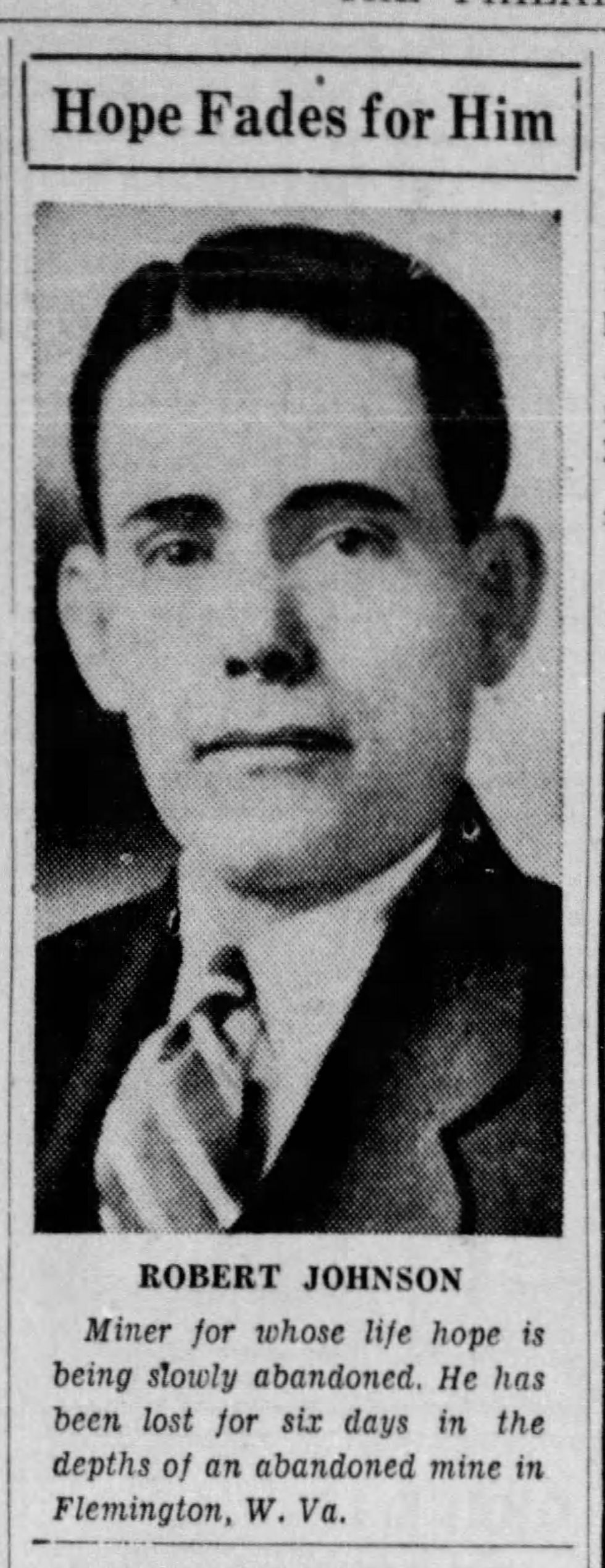
Two hundred rescuers worked around the clock those first four days. Johnson’s dog, Bully, led rescuers to an icy pool deep in the mine, swam a short distance into the water, and returned to the shore whining. Johnson’s footprints at the edge of the pool convinced most of the rescuers that the likeliest scenario was that Johnson had become disoriented in the dark and stumbled into the water and drowned. State mining officials were called in and began to dig a trench from the lake to the mine’s entrance to drain the water. As they neared completion of the trench, about 40 tons of earth and slate collapsed, forcing their retreat. The next day they reentered the mine and began digging the trench again.

By now, eight days had passed since Johnson entered the mine. Newspapers around the country reported on the ongoing search. The Miami Herald, the Seattle Star, the New York Daily News, and the Los Angeles Times kept readers in all corners of the country apprised of the ongoing search, though reports were increasingly bleak as days passed with no sign of Johnson. Closer to home, the Altoona Pennsylvania Tribune reported that Delvera Johnson collapsed from worry and strain, having spent much of the last week at the mine’s entrance with hundreds of her neighbors. 60 youths from the Civilian Conservation Corps joined the effort to redig the trench and drain the pool.
By the next morning, the pool was finally drained, revealing a slate fall beyond the waters. Rescuers were now just over two miles from the entrance to the mine. As they worked to get around the slate, one of the men heard a weak voice. Having seen light for the first time in over eight days, Robert thought he was imagining things. But desperate to cling to hope, he was saying “Bob, please don’t lose that light.” The Bristol Herald Courier reported the details:
RESCUE MAN AFTER 8 DAYS IN A MINE
Robert Johnson Suffering Little Ill Effects From His Imprisonment
Fleming, W. Va., Feb 5
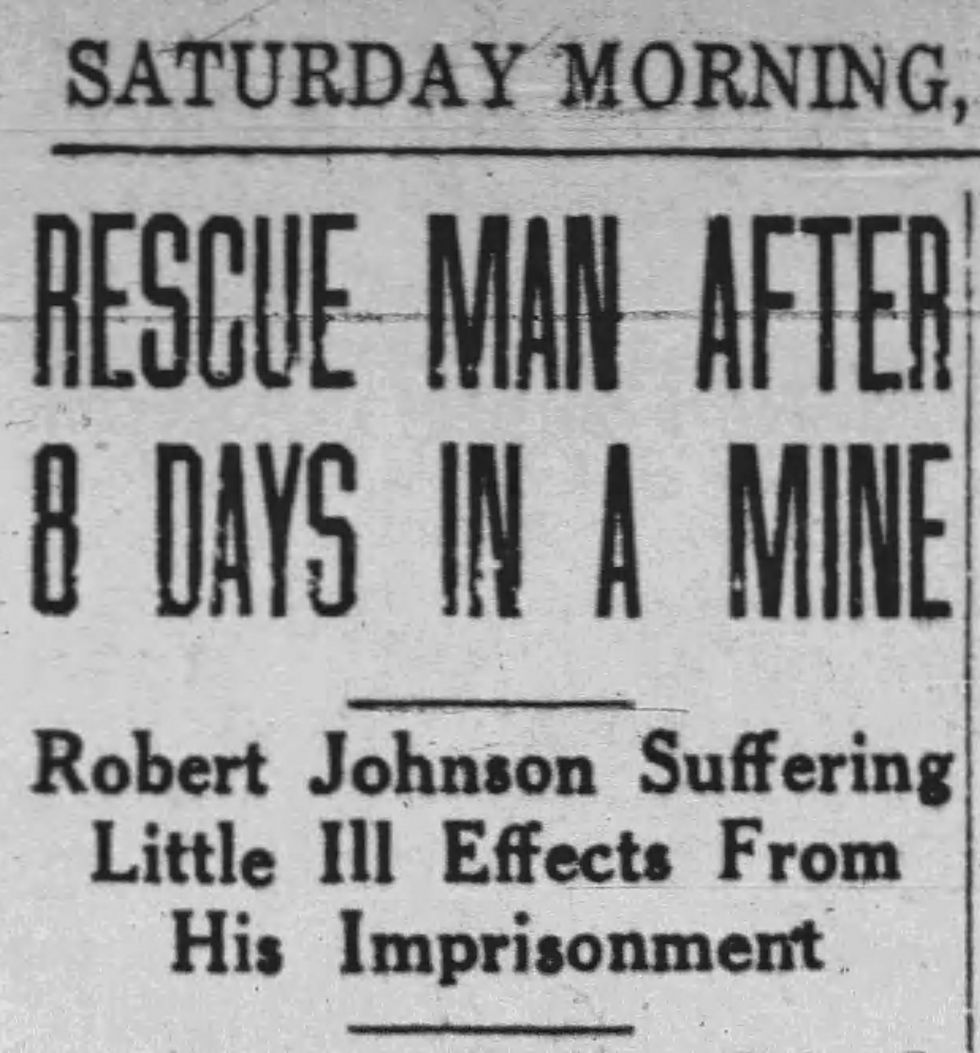
Robert Johnson, lost for eight days in debris-filled passageways of an abandoned mine, was carried to safety today, alive, well, and puffing happily on a cigarette. “I’d given up all home, said the 36-year-old rural mail carrier to rescue workers who found him nearly two miles from the mine entrance early today. Johnson, who carted coal from the mine in his spare time for sale to neighbors, was found huddled behind a heap of jagged chunks of slate.
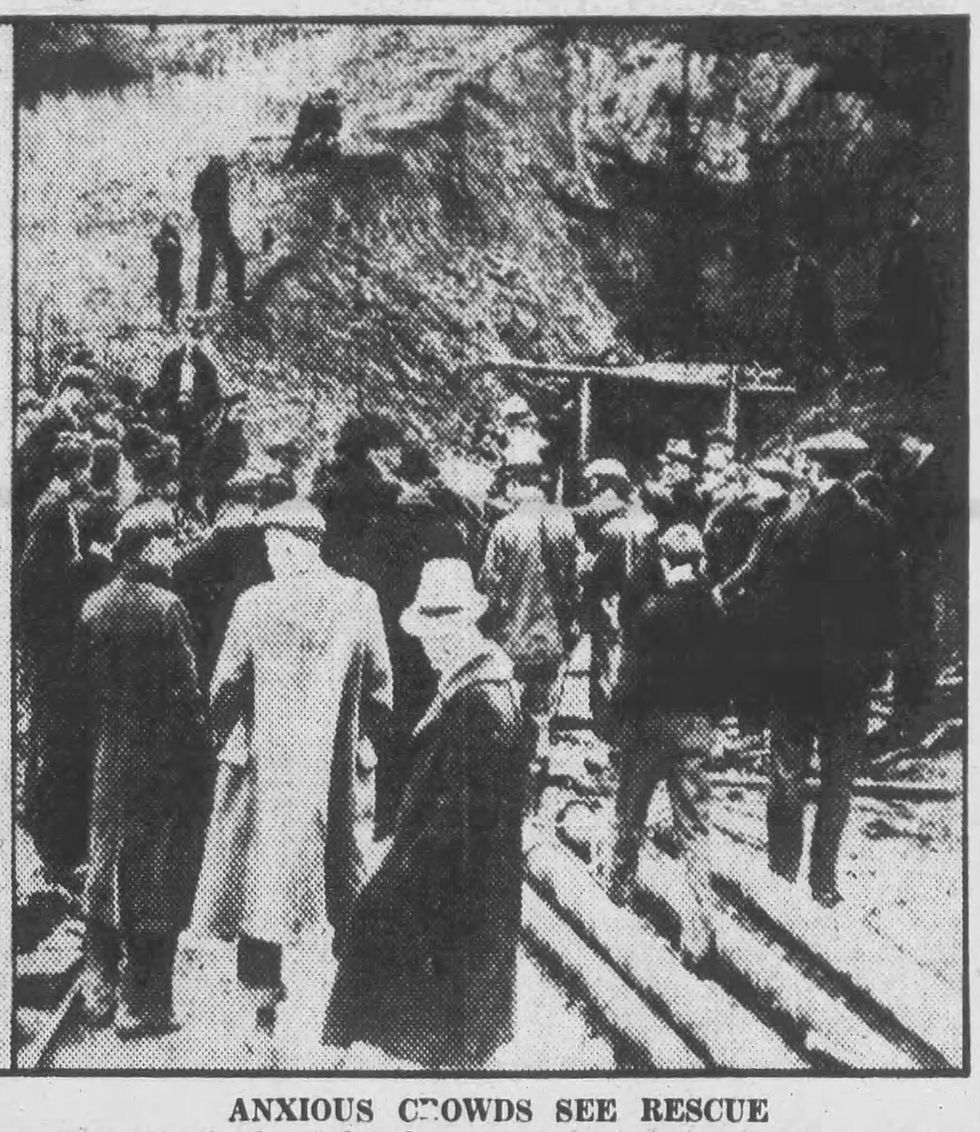
Rescue crews at first expected difficulty in removing the slate, but had little trouble reaching the imprisoned man.
Three of the scores of volunteers who had search the mine day and night since Johnson disappeared on January 27, heard his feeble cries for help while exploring the narrow tunnel. His first words were to assure himself he hadn’t merely imagined a light had cut through the dark.
C.P. Pride, assistant safety director for the state department of mines, quoted him:
“I told myself, ‘Bob, please don’t lost that light.’”
He didn’t.
As the rescue party came closer, he called to Mike Stanko Jr., Edward Whitehair, and William Westfall, all his friends and neighbors.
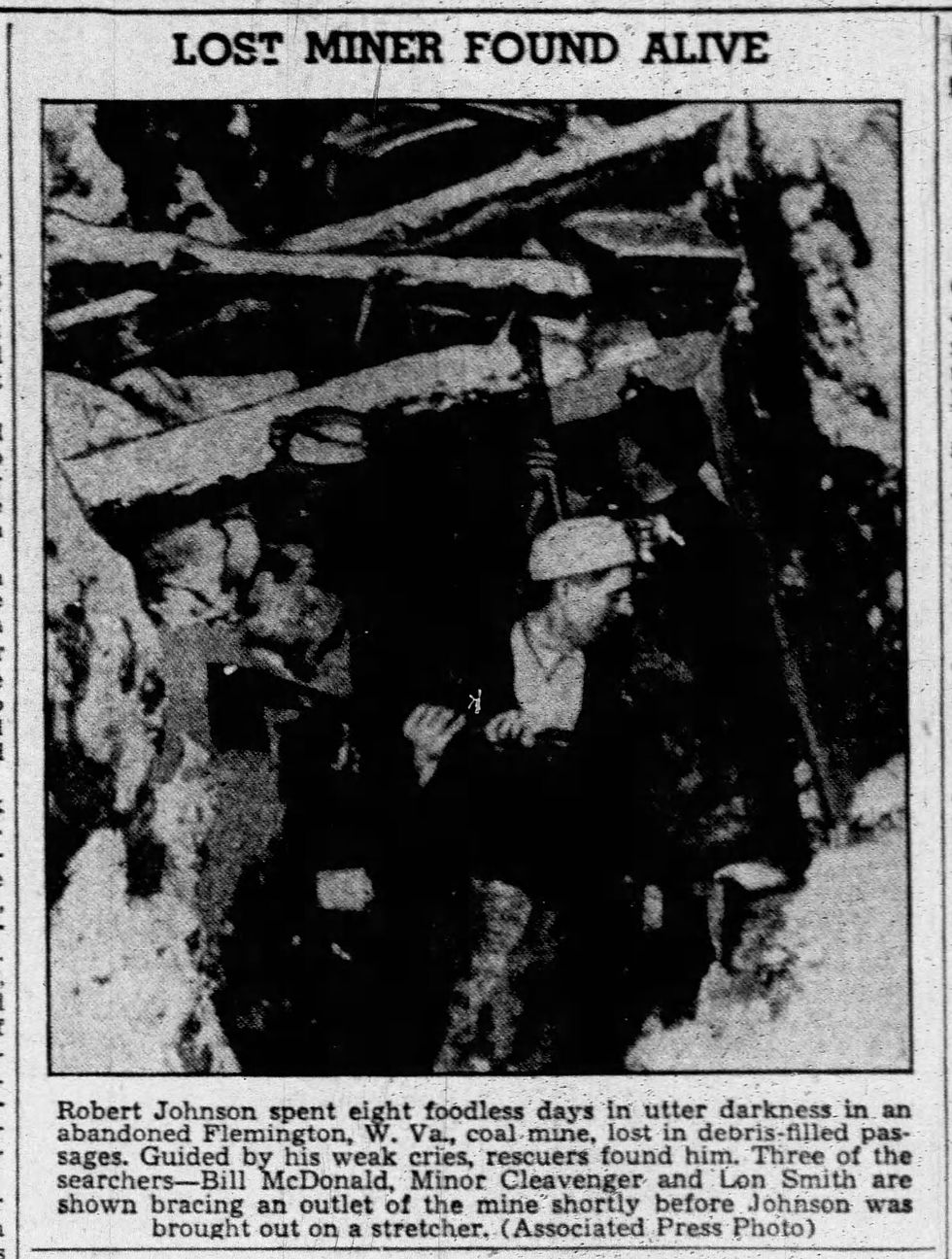
“Take your time,” said Johnson. “I’ll guide you by your light.”
They cautiously approached the heap of slate, reached through a hole and gripped Johnson’s hand—assurance he was safe.
Then word went to the surface, sped through this little community of about 400 population in northeastern West Virginia.
Pride and eight others gathered stretchers and blankets.
They hurried into the mine, waded and swam through a deep pool of water covering nearly an acre where originally many believed Johnson drowned while trying to open clogged drains. Pride told of administering first aid, and declared:
“Johnson's physical condition was excellent considering the long exposure. He had been drinking sulfur water and his lips were badly parched. He thought he had been in the mine for a month.” Placed on a stretcher, Johnson recognized one of the men who carried him from the mine, wading shoulder deep through five feet of icy water.
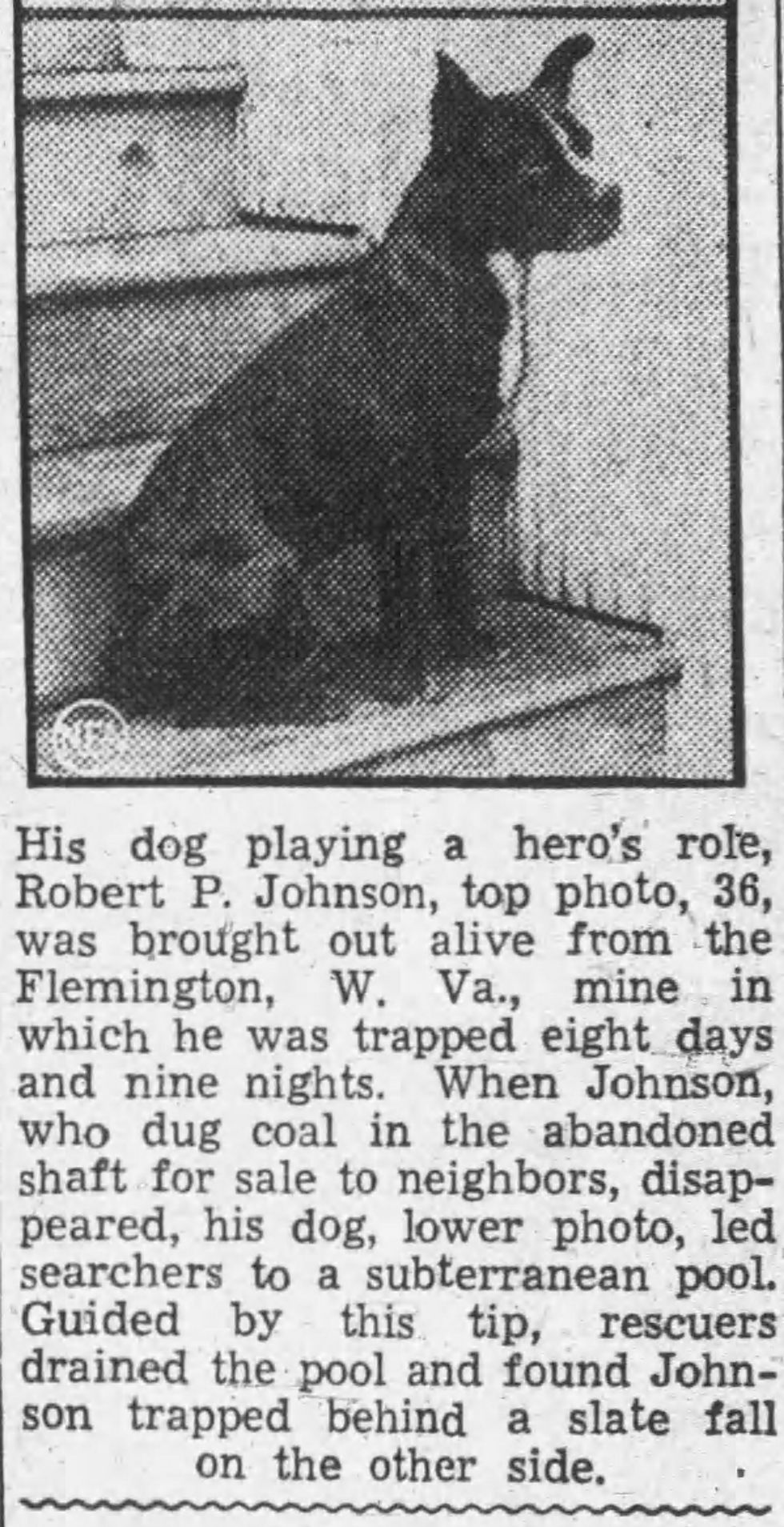
Near the mine entrance they halted. It was comparatively warm in the mine but outside a heavy snow was falling. They heated stones, wrapped them in blankets, and placed them about Johnson, who rested quietly on the stretcher.
Taken out on the mountainside, Johnson was carried a quarter of a mile down a snow-covered path to a waiting ambulance. There he was joined by his wife—among his first questions was “how is my wife”—and hurried to a hospital 15 miles away in Clarksburg, the nearest large city.

At the hospital, a reporter asked Johnson what the moments were like just before his rescue.
“I decided to pray,” he said. “I prayed. I was lost—just lost—that’s all I know. I lost all count of time. It must have been about five days that I wandered about in there, praying that God would keep me alive and send someone to hunt me. I went to sleep. When I awoke I couldn’t move. It was then I decided I was done for. It wasn’t long then until they reached me. Thank God my prayers have been answered.”
The incredible endurance that rescuers said Johnson displayed during his nine days and eight nights underground was displayed throughout the rest of his long life. Robert Johnson, who I always called “Uncle Bob,” died at the age of 91 in 1993.

In my childhood experience of Uncle Bob, I never would have guessed or known that he had ever endured such a traumatic experience. He was never anything short of wonderful to me, and my childhood visits to see him in West Virginia are among the happiest f my childhood memories. I remember Bob letting me sit in his lap as he drove his old Jeep, him pushing me on his rope swing, and my shock as he popped his dentures out at me. Some of Bob’s sayings, like calling the kids (including me) “Buckshot,” are continued and cherished family traditions, and the impact of Bob’s life continues to ripple out in myriad ways through his entire family. Because Bob survived those harrowing eight days, he went on to be a father, an uncle, a grandfather, a grand uncle. Because Bob survived those eight days, his memory will live forever.







Comments